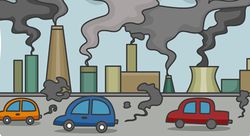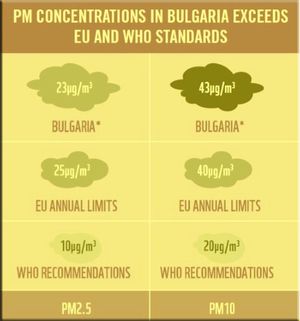Background:Sofia City
|
|
|
|
|
|
Introduction
Why is air pollution a concern?
Exposure to outdoor air pollution is associated with a broad spectrum of acute and chronic health effects ranging from irritant effects to death. New science also shows air pollution as an emerging risk factor for children’s health and even diabetes. Sensitive and vulnerable groups such as pregnant women, children, the elderly and those already suffering from respiratory and other serious illnesses or from low income groups are particularly affected.
Air Pollution in Bulgaria
According to the European Environmental Agency, Sofia is the most polluted capital in Europe. With the third highest mortality rate (per 100.000 population)1 from air pollution in the world, after North Korea, and Bosnia and Herzegovina, WHO estimates that poor air quality costs the equivalent of 29.5% of Bulgaria’s GDP through reduced productivity and the costs to the country’s health services.
It is important to note that while the European Union set the limit of 25 μg/m3 as the maximum annual average for PM 2.5, the World Health Organization (WHO) recommends that PM2.5 should not exceed 10 μg/m3 as an annual average.
Despite so, Bulgaria is in almost constant breach of EU air quality laws aimed at protecting people’s health. In 2017, the EU Court of Justice ordered Bulgaria to take action to improve its air, stating that Bulgaria not only failed to meet the binding EU’s air quality standards, but also remained inactive in improving air quality.
We seek to understand the underlying factors resulting in the chronic poor air quality in Bulgaria. Specifically, we will be looking at Sofia City which is the capital and largest city of Bulgaria.

